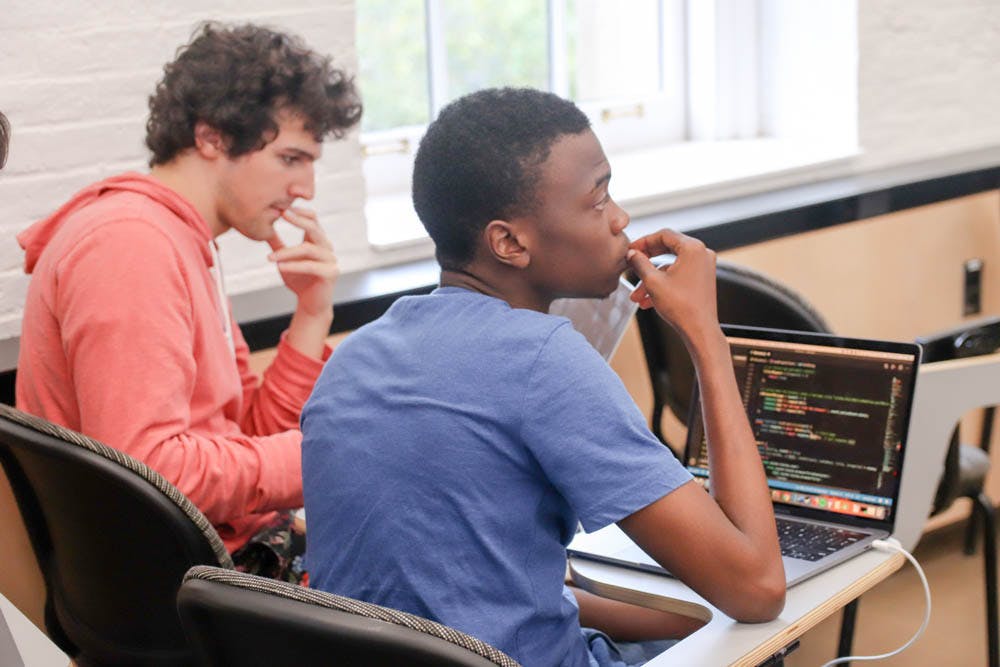Huddled over laptops lit by colorful lines of code, around 80 students collaborated in 13 teams at the fourth annual Brown Hack Health event over the weekend.
The hackathon allowed students from different disciplines — ranging from art to engineering — to devise innovative solutions that address pressing problems in healthcare and medicine.
This year’s Hack Health theme was mental health, a topic Co-Presidents Renny Ma ’20 and Soham Kale ’21 said was important to spotlight since it is often underfunded in research and marginalized in discussions around health. “Just to have an event where the focus is solely mental health, I feel like that’s rare and we wanted to bring that to Brown,” Ma said.
Students pitched problems they wanted to address and then were placed into teams. They spent the rest of the weekend designing their products, discussing areas for improvement and receiving help from mentors.
Sumaiya Sayeed ’19.5, Shailen Sampath ’20, Kaitlyn Lew ’20 and Bashar Zaidat ’21 worked as a team on “Vibe,”a blanket-like covering for hospital beds and chairs that would help aging patients with the side effects of dementia or delirium. They hoped their device would use vibrations to help soothe pressure points and would produce auditory stimulation to serve as music therapy.
Often, physicians turn to restraints or sedative medications to calm these patients down, Sayeed said. “This was something doctors have told us is really difficult to deal with,” and she and her team hoped to provide an alternative with Vibe, Sayeed added.
Vibe took home the $500 Biosay grand prize. The $100 categorical prizes went to PerHuman for best tech-based and coded solution and GradConnect for honorable mention.
The PerHuman team proposed an Alexa program that helps families and peers provide better verbal feedback to those suffering from mental illness. Inspired by interactive, choose-your-own-adventure stories, PerHuman would provide real life situations to users in which someone might need verbal support. After a user responds to Alexa, PerHuman would analyze the users’ replies for negative keywords and phrases and offer guidance for a better response.
GradConnect aims to address depression among graduate students by using technology to foster social connections through personal one-on-one meet-ups. Since graduate students can be prone to feelings of isolation and loneliness, the app and website of GradConnect would assign lunch and exercise partners randomly, based on the users’ availability.
Although participants were judged on their product, Ma said Hack Health is unique in focusing more on the idea and not on the daunting task of creating a functioning final product. “We want to emphasize that it’s important to think about the problem that you’re addressing, connect with the stakeholders related to that problem and have sustainable models moving forward so that your idea can actually pan out successfully,” she said.
The panel of six judges included Barrett Hazeltine, professor emeritus of engineering; Jen Nazareno, assistant professor of public health and entrepreneurship; Neil Sarkar, director of the Brown Center for Biomedical Informatics; Geoff Capraro, associate professor of emergency medicine and pediatrics; Corinna Roy, division director of Behavioral Healthcare at R.I. Department of Behavioral Healthcare, Developmental Disabilities and Hospitals; and Mark Zimmerman, professor of psychiatry and Human Behavior. Projects were evaluated on their innovation, relevance to a mental health issue, response to the stated problem, economic sustainability and accessibility to its target audience, according to Hack Health’s website.
Megan Ranney, associate professor in the Department of Emergency Medicine at Alpert Medical School, encouraged students to consider ethics in designing digital tools for patients.
“If we’re trying to create health, we have to create it for the people whose health we’re trying to improve,” she said during her a keynote presentation at the beginning of the weekend.





